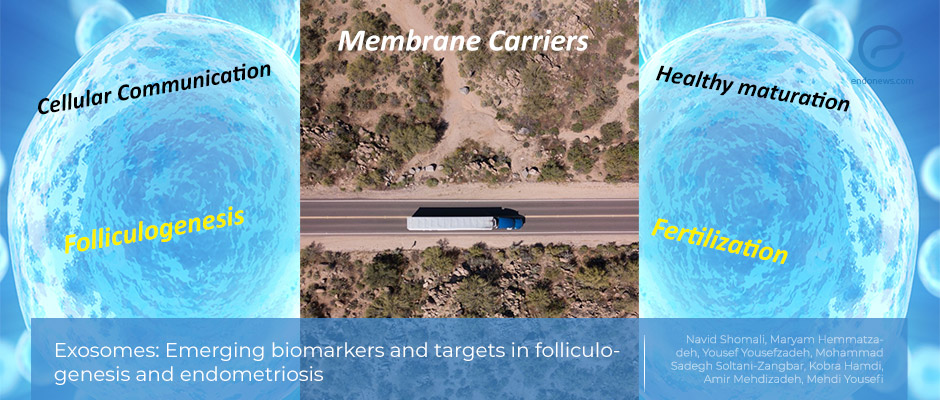Cellular communications: Exosomes in Endometriosis
Sep 17, 2020
Emerging biomarkers and targets in folliculogenesis and endometriosis
Key Points
Highlight:
- Dr. Yousefi group summarizes the recent reports of extracellular vesicles (EV) that have a role during folliculogenesis and in the endometrium.
- As these exosomal cargos may alter folliculogenesis and endometrium, their abnormal function may cause endometriosis and impaired folliculogenesis resulting in infertility.
Background:
- Exosomes are cell to cell communicators and their alteration may cause many disease processes, including endometriosis.
- Their important "cargo" role in cell-to-cell communication during folliculogenesis and endometrial development, necessitates examining their alterations in the context of endometriosis.
Key points:
- Eutopic endometrium epithelium releases exosomes into the uterine cavity, transferring their contents to the adjacent endometrium or blastocyst, which can affect implantation.
- These data indicate that exosomes derived from endometrium may play an important role during the implantation.
- In endometriosis, one study showed that the delivery of the miR-214-rich exosome isolated from the stroma-ectopic cells led to inhibition of fibrosis and improvement in endometriosis lesions.
- Other studies have shown the relationship between exosomes and immune function in endometriosis, indicating the critical role of macrophages.
- It has also been suggested that exosomes containing interferon tau may facilitate the endometrial interaction, resulting in optimal uterine environment formation required for maternal bonding.
Conclusions:
- A dynamic and direct means of relation in endometrium and creation of the endometriosis can be defined by extracellular vesicles.
- A better understanding of these interactive molecular mechanisms may help the progression of new regulatory approaches with biological, diagnostic, prognostic, and therapeutic values.
- Advances in isolation methods and EVs identification seems to be critical.
Lay Summary
Exosomes have been reported as cell-to-cell communicators, transfer many molecules such as miRNAs, RNAs, and proteins, and their alteration may cause many disease processes, including endometriosis. Considering the role of exosomes and their cargos in a cell to cell communication as important factors in folliculogenesis and endometrial development, understanding of exosomes in the endometriosis context is highly important.
Here, Dr. Yousefi group summarizes the recent reports of extracellular vesicles (EV) secreted by follicles and endometrium. This review paper is recently published in the journal of “Reproductive Immunology”.
Extracellular vesicles are membrane structure vesicles containing cell to cell-communicating molecules, including exosomes. It has been shown that the endometrial epithelium releases exosomes inside the uterine cavity, thereby transferring their contents to the adjacent endometrium or blastocyst, which can affect implantation. These data indicate that exosomes derived from endometrium may play an important role in cell to cell interaction between blastocysts and the endometrium during the implantation.
In endometriosis, several extracellular vesicles containing miRNAs have been studied. One previous study showed that the delivery of the miR-214-rich exosome isolated from the stroma-ectopic cells led to inhibition of fibrosis and the improvement of endometriosis. Other studies have also shown the relationship between exosomes and immune function in endometriosis, indicating the critical role of macrophages in their development. In another study, it has also been suggested that exosomes containing interferon tau may facilitate the endometrial interaction, resulting in optimal uterine environment formation required for maternal bonding.
A dynamic and direct means of relation in endometrium and creation of the endometriosis can be defined by extracellular vesicles. A better understanding of these interactive molecular mechanisms may help the progression of new regulatory approaches with biological, diagnostic, prognostic, and therapeutic values. Advances in isolation methods and identification extracellular vesicles seem to be critical.
Research Source: https://pubmed.ncbi.nlm.nih.gov/32717674/
Endometriosis Exosomes Follicle evolution Pregnancy

